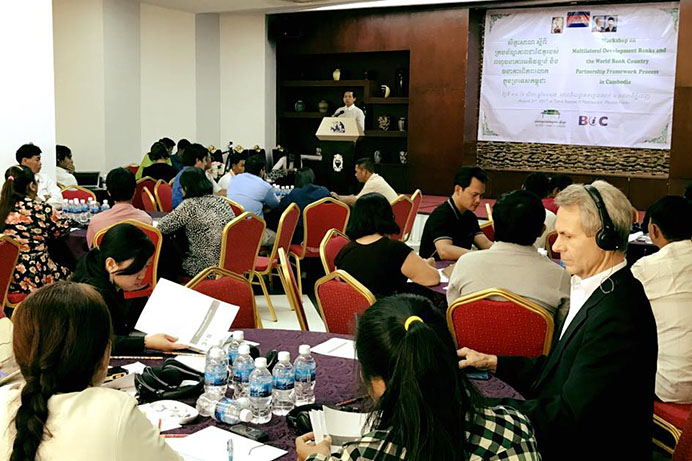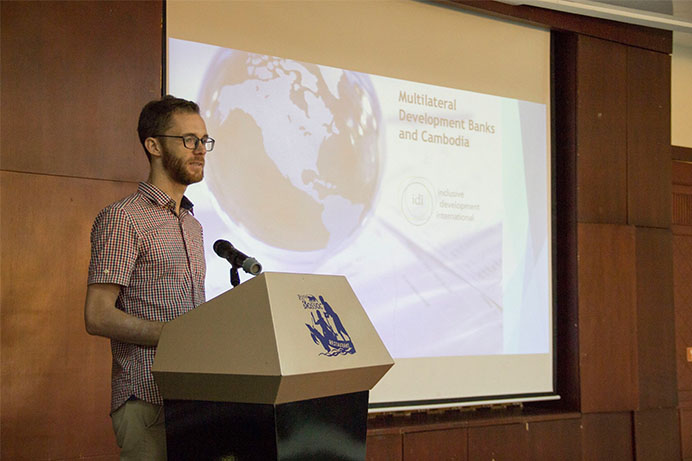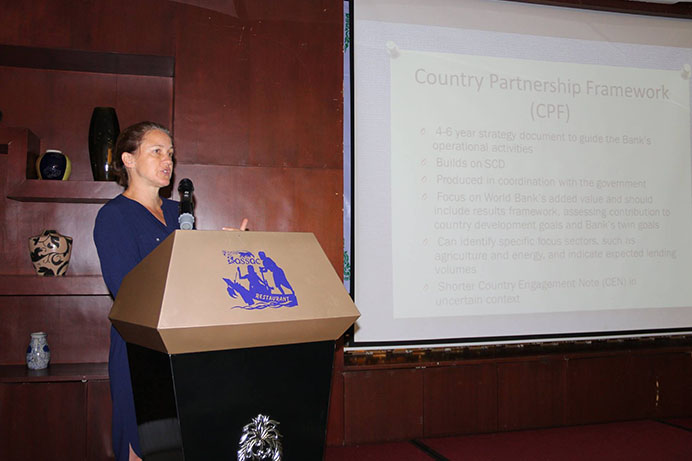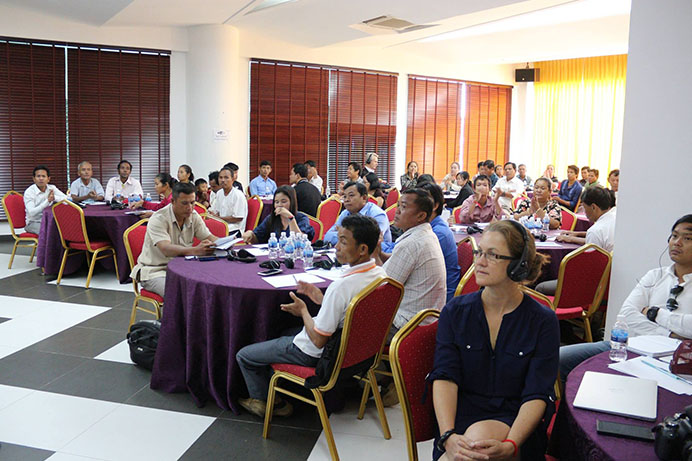
The NGO Forum on Cambodia (NGOF) together Bank Information Center (BIC) co-organized Workshop on Multilateral Development Banks and the World Bank Country Partnership Framework (CPF) Process in Cambodia at Tonle Bassac II, Phnom Penh on 31 August 2017. There are 72 participants joint in this workshop coming from CSO members, Partners and Affected communities.
This workshop aims to increase Cambodian civil society’s understanding of and capacity to engage with MDBs, including the World Bank consultations on its new strategy for Cambodia, the Country Partnership Framework, with three main objectives:
1. To increase awareness and understanding of MDB operations and involvement in Cambodia, focusing on the World Bank, Asian Development Bank (ADB) and the Asian Infrastructure Investment Bank (AIIB)
2. To inform civil society and communities they work with about the World Bank’s CPF consultation process, and build capacity for engagement
3. To identify common advocacy positions, with a particular focus on land rights, forest related issues and climate change
Dr. Tek Vannara, NGOF Executive Director said in the workshop that “The World Bank is one of the world’s largest sources of funding and technical assistance for developing countries. Its projects and policies affect the lives and livelihoods of billions of people worldwide. Other MDBs play a large role in Cambodia too, most importantly the Asian Development Bank (ADB) is the country’s largest multilateral development partner, and has approved $2.86 billion in lending, grants, and technical assistance for Cambodia since 1966. Its current Country Partnership Strategy (CPS) runs from 2014-18, and the workshop will therefore also provide an opportunity to start building CSO capacity in advance of the CPS consultations, which will most likely start in 2018.

Moreover, the China-led Asian Infrastructure Investment Bank (AIIB) is a new player in Asia with potential significant impacts. Cambodia is a member, and this workshop will provide an introduction to the AIIB, including a particular focus on its energy strategy.
The workshop will include plenary sessions with presentations, Q&A and discussions, to build a shared understanding on key issues, as well as advocacy positions and activities moving forward. To allow for more in depth discussion, the workshop will include a particular focus on land rights, forest related issues and climate change.”

Together Mr. Mark Grim ditch and Ms. Petra Kjell respectively from IDI and BIC “Civil society plays an important role in holding the World Bank accountable to its mission. One way to do so is to monitor specific investments and to track the social and environmental effects of its projects, programs and policies on local communities. Where harm occurs, civil society can trigger the Bank’s accountability watchdogs Another way is to try and influence World Bank investments ‘upstream’ –or before they happen– to ensure that the Bank prioritizes protecting the environment and the needs of the most marginalized groups. There are several reasons why civil society should engage in the Country Partnership Framework (CPF) process, most importantly as CPFs provide what will become the rationale for World Bank projects over a four-to-six year period in a borrowing country. The World Bank is one of the world’s largest sources of funding and technical assistance for developing countries. It has been involved in Cambodia since 1993. In this respect, influencing a CPF is a way to stop ‘bad’ projects before they happen (or continue) and push for ‘good’ projects that will, for example, support governance measures to protect forests and forest peoples, channel money directly to indigenous-led forest management projects, or fund renewable energy access for poor communities. The CPF process also provides opportunities to raise red flags about how some World Bank interventions can undermine national legislation that ensures citizens’ basic human rights”
Bank Information Center (BIC) is an international NGO that partners with civil society in developing and transition countries to influence the World Bank and other international financial institutions to promote social and economic justice and ecological sustainability. BIC has collaborated with the NGO Forum on Cambodia (NGOF) to develop and execute a civil society workshop to increase understanding and engagement on issues related to Multilateral Development Banks (MDBs) operating in the region, with a particular focus on the upcoming consultations on the World Bank’s new strategy for Cambodia, the Country Partnership Framework, to increase Cambodian civil society’s capacity to engage effectively and influence the outcomes.

In 2014 the World Bank launched a new approach to its engagement in borrowing countries, introducing two new documents to guide the Bank’s operations in borrowing countries: 1) the Systemic Country Diagnostic (SCD); and 2) the Country Partnership Framework (CPF). The SCD is produced by Bank staff and aims to identify the key constraints and opportunities for poverty alleviation and is used as an input to the CPF. The CPF is a four-to-six year strategy document that the World Bank develops to guide its operational activities in a developing country. Bank requirements states that the documents should be developed in stages through consultative processes with the government and key stakeholders.